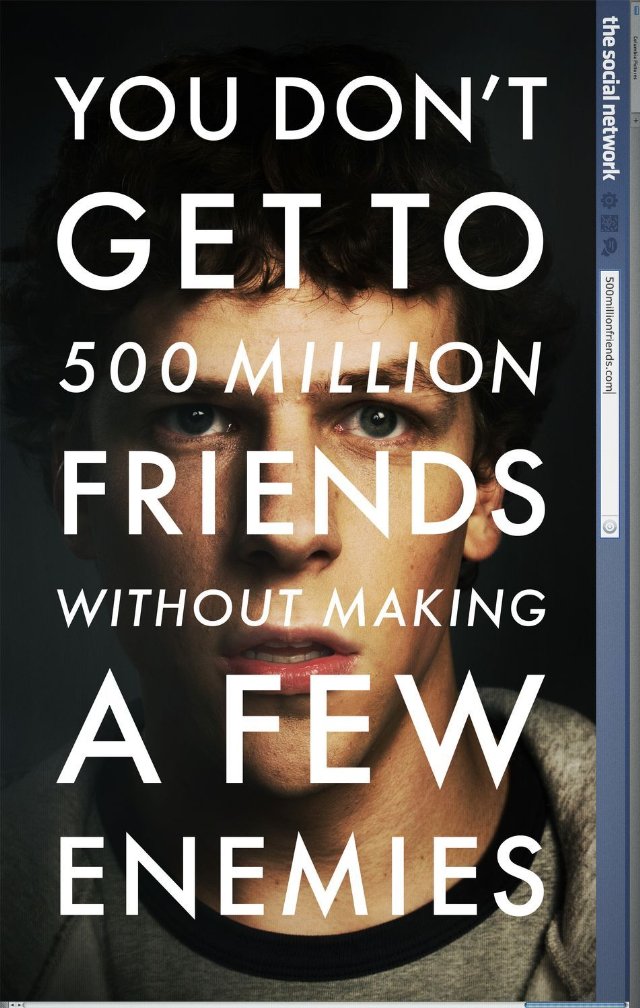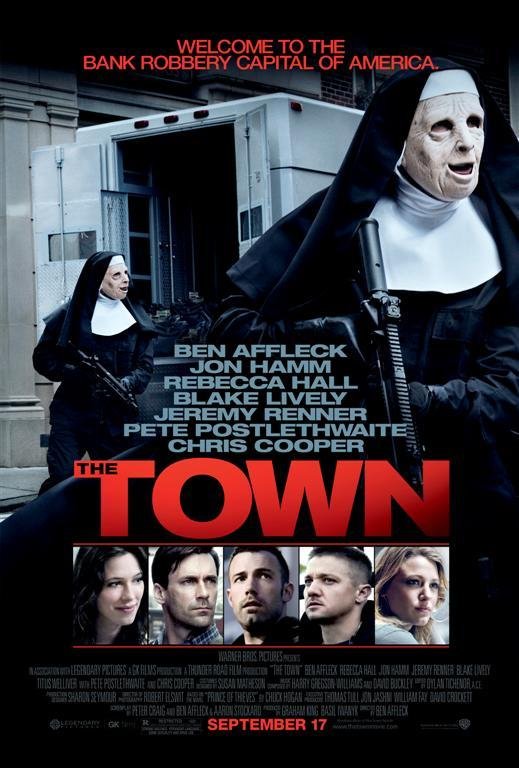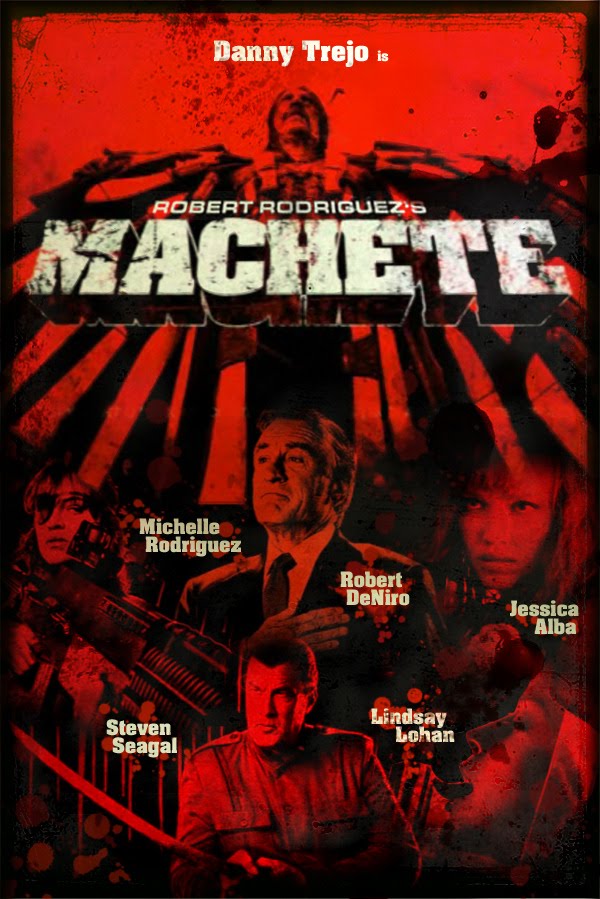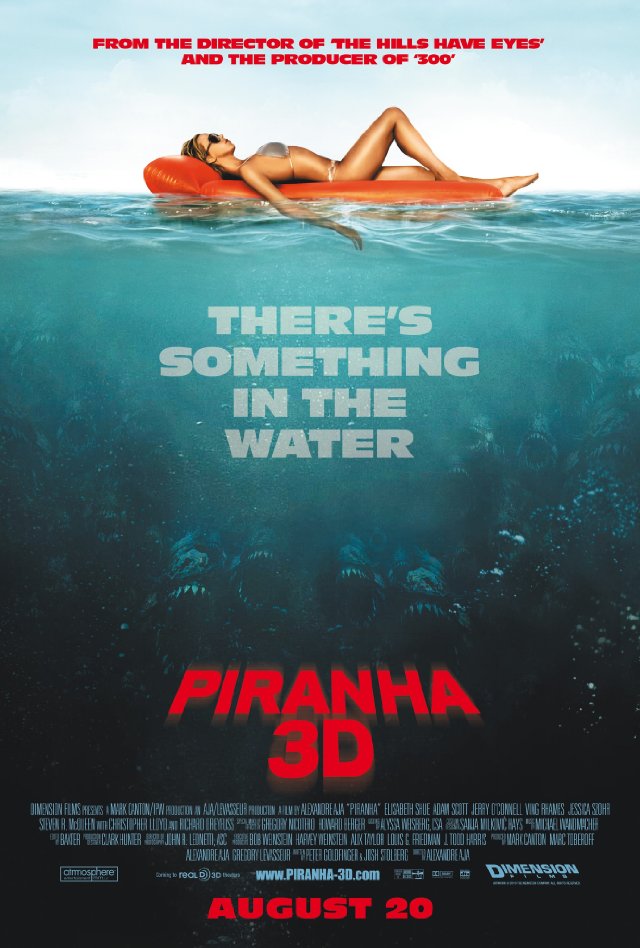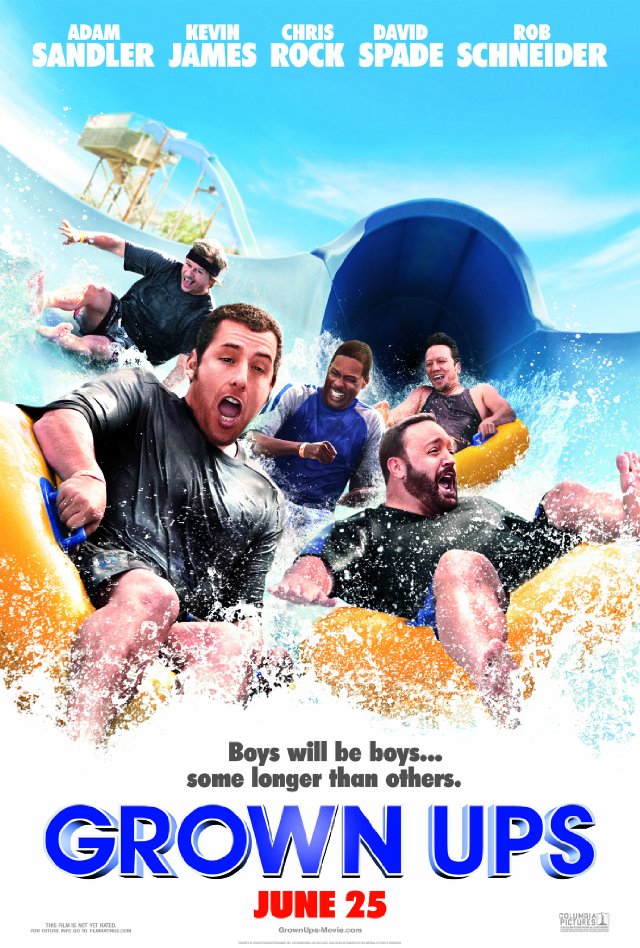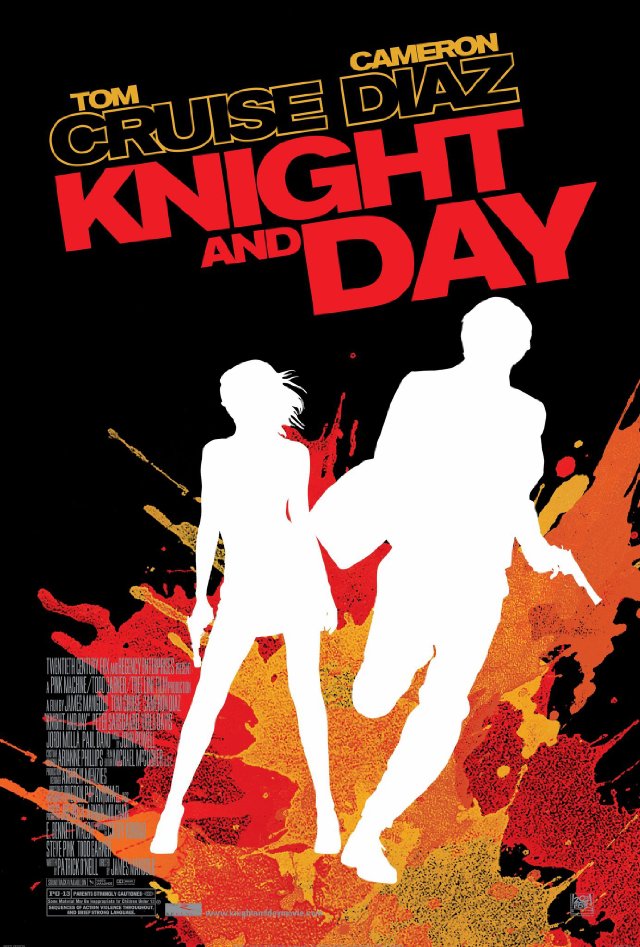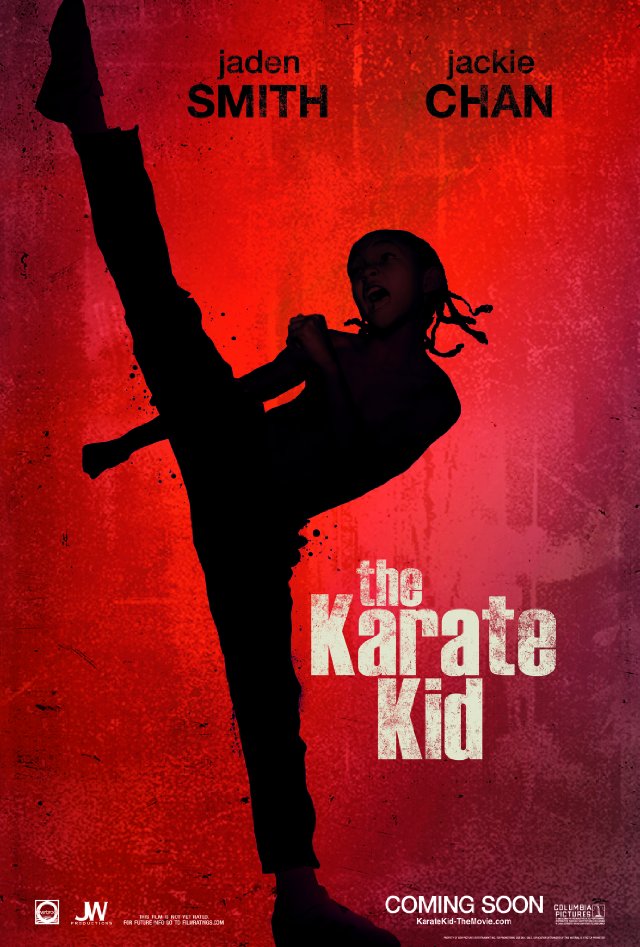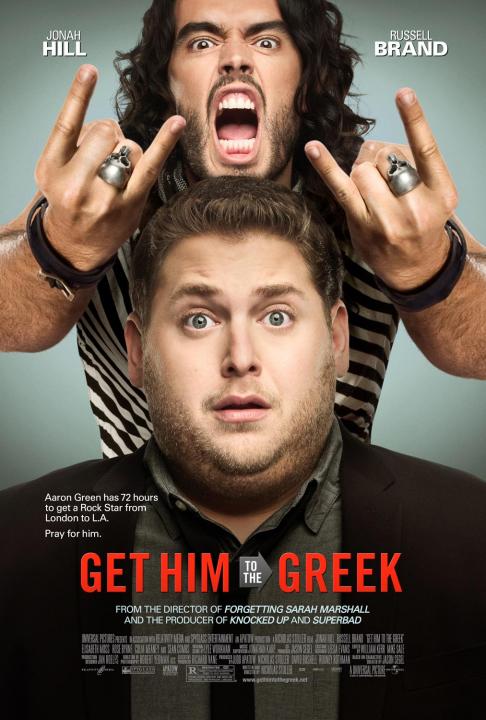Status: In theaters (opened 10/1/10)
Directed By: David Fincher
Written By: Aaron Sorkin
Cinematographer: Jeff Cronenweth
Starring: Jesse Eisenberg, Andrew Garfield, Justin Timberlake, Armie Hammer, Rashida Jones
Imagine being on the UHF program “Stanley Spadowski’s Clubhouse” and winning the opportunity to drink from the firehose, only instead of water coming out, the hose spews dialogue into your face. That’s a lot what the experience of watching The Social Network can feel like. This movie is full of words, coming at you at a mile a minute at almost all times. Jessie Eisenberg, as the onscreen personification of Facebook founder Mark Zuckerberg, does the bulk of the firehosing. He sometimes sounds like he’s rushing to spit out his lines in record time, but by the end of the film’s opening scene, you’re already used to it and totally engrossed. It takes balls to write a movie like this, and a lot of talent, too. In less-capable hands it’d come out feeling like a wordy, jumbled mess, but Aaron Sorkin is more than capable. His screenplay, which I’ve read came in at 160 pages (a typical 2-hour movie, which this is, would be more around 120), is jam-packed with dialogue spouted by fast-talking characters, and it drives the story in almost unbelievable ways.
The sniff test for me for any technology-based movie is how it deals with the specifics of its technologies, and The Social Network passes with flying colors. While Sorkin lets himself get a little carried away, particularly during a scene where Zuckerberg “interviews” interns by putting them to a hacking test while constantly feeding them shots, for the most part his characters’ dialogue is legit. We see Zuckerberg live-blog the creation of Facemash, Facebook’s predecessor, and his voice-overs describing his use of PHP, perl scripts, and wget to acquire the classmate pictures he needs from shoddily-configured Apache servers hold up. Sorkin has done his research, and it’s no surprise; you throw this much information at an audience at such a rapid pace for two solid hours, they’re going to smell it if you’re just trying to sneak stuff past them.
Based on the legitimacy of the computer-related dialogue, I have to believe that the same amount of research went into the court records that form the basis of The Social Network‘s narrative. The story is told from the perspective of two separate depositions, involving the two major lawsuits that were brought against Zuckerberg after Facebook started to take off. 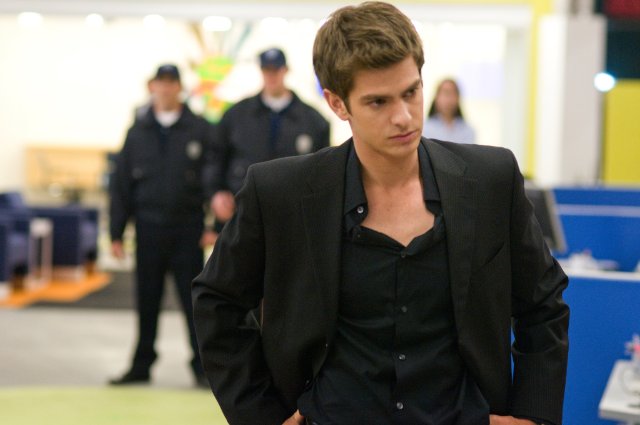 The first comes from his best (and only) friend, Facebook co-founder and original CFO Eduardo Saverin (Andrew Garfield). The second is from Tyler and Cameron Winklevoss (Armie Hammer’s face on both twins, with Josh Pence providing Tyler’s body). The “Winklevi,” as Zuckerberg refers to them, had devised a website called Harvard Connection (later ConnectU) and hired him to provide programming assistance. They claim that he stole their idea and cut them out of the loop when he launched his own website. Saverin, on the other hand, claims he was unfairly squeezed out of his ownership position in the company—it was his initial $1000 investment that got it off the ground.
The first comes from his best (and only) friend, Facebook co-founder and original CFO Eduardo Saverin (Andrew Garfield). The second is from Tyler and Cameron Winklevoss (Armie Hammer’s face on both twins, with Josh Pence providing Tyler’s body). The “Winklevi,” as Zuckerberg refers to them, had devised a website called Harvard Connection (later ConnectU) and hired him to provide programming assistance. They claim that he stole their idea and cut them out of the loop when he launched his own website. Saverin, on the other hand, claims he was unfairly squeezed out of his ownership position in the company—it was his initial $1000 investment that got it off the ground.
From the retrospective view of these depositions, we get three versions of the story: Saverin’s, the Winklevoss’s, and Zuckerberg’s own account. The Rashomon style of storytelling Sorkin employs works well for two reasons. First, it gives a natural excuse to jump around in the story, to skip to the interesting parts of Facebook’s tumultuous early years. Second, it provides a clever way to avoid any claims of libel or of fabricating details; in getting three different points of view on the events, things are left just ambiguous enough to avoid being slanderous.
 That’s a good thing, because The Social Network doesn’t exactly paint a pretty picture, particularly of Zuckerberg. It does, however, give him a fair shake; he’s depicted as an insanely driven kid who happens to have a knack for knowing what people want out of the new online experience he’s trying to create. But like most stereotypical computer geeks, he lacks in social skills, to the point of ignoring the desires or feelings of anybody else he’s involved with. He’s smart, that’s clear, though I’m not sure why he’s always referred to as a “programming genius”—Facebook is the most standard, typical, and simple website you could make, technology-wise. But that’s not where Zuckerberg’s genius lies; it’s not how he does it that’s impressive, it’s the instinct he has for what to create that makes Facebook an instant success.
That’s a good thing, because The Social Network doesn’t exactly paint a pretty picture, particularly of Zuckerberg. It does, however, give him a fair shake; he’s depicted as an insanely driven kid who happens to have a knack for knowing what people want out of the new online experience he’s trying to create. But like most stereotypical computer geeks, he lacks in social skills, to the point of ignoring the desires or feelings of anybody else he’s involved with. He’s smart, that’s clear, though I’m not sure why he’s always referred to as a “programming genius”—Facebook is the most standard, typical, and simple website you could make, technology-wise. But that’s not where Zuckerberg’s genius lies; it’s not how he does it that’s impressive, it’s the instinct he has for what to create that makes Facebook an instant success.
What the movie really boils down to is a story about ego and greed. When Zuckerberg meets Sean Parker (Justin Timberlake), one of the founders of Napster, he adopts the angst-filled party-boy’s worldview, happy to give venture capitalists the finger (literally) because he knows that they need him more than the other way around, and he revels in flaunting his newfound status. He turns his back on his friend not out of spite, but out of ambition, and the way Sorkin’s screenplay handles the relationship between Zuckerberg and Saverin—showing both perspectives, eliminating any questions of malice—is more measured than the version in Ben Mezrich’s book The Accidental Billionaires—the film’s primary source—which is told a bit more subjectively from Eduardo Saverin’s point of view.
There are two things that I found really refreshing about The Social Network. For one, although it’s a big-budget movie (and surely an awards-season contender), it doesn’t feel like a typical “tentpole” release. David Fincher’s direction is elegant and classy; the performances are highly characterized, but none feel over-exaggerated; there are great special effects, but you’d never realize it from watching the movie; even the score, by Trent Reznor, appropriately sets the pace and tone without drawing unnecessary attention to itself.
The other thing, the thing I really liked, is how the film makes no attempts to depict Facebook as super-relevant to culture in general, or to over-state its importance. It’s telling a story about a kid who found success at a young age and let it get to his head, and it leaves things at that. Yes, the success he achieved is by coming up with something that seemingly everybody wants to use—and use a lot—but we never get any speeches about some supposed importance of the website itself. It’s just the vehicle by which these characters embark on their journey. (Timberlake’s Parker does get a little carried away with the overarching cultural significance of what they’re doing, but it’s in character for him, it’s not the film itself telling us we should recognize this supposed “greatness.”) What’s amazing, and impressive, and downright enjoyable, is that The Social Network resonates more because of this. It’s a timely story, yes, but it’s one about truths of human nature that apply universally.
Comments Off on Baby You’re a Rich Man
With my review of The Town posted, I’m more or less caught up on my reviews, with a small exception: I’ve made the executive decision to ignore two movies I saw earlier this summer, because it’s just been too long since they were out, and I doubt anybody cares to read about them anyway. But here are really, really brief thoughts on them, in the interest of being thorough:
- The Other Guys was a pretty funny, if standard, Will Ferrell comedy. Like most of the Ferrell-Adam McKay collaborations, it goes a too bit far when it runs out of jokes (in this case, Ferrell’s “Gator” alter-ego), but it holds its own. It actually made me feel bad for Kevin Smith, who tried for a similar type of thing with Cop Out but failed pretty miserably. The most impressive thing about The Other Guys, in fact, was that in parodying an action movie, it actually ended up having some legitimately good action scenes. It’d make for a good rental.
- The Switch, on the other hand, was really bad. It sucks to say that, because Jason Bateman is usually such an enjoyable actor to watch, but here he’s all wrong for the role. The premise of the movie is completely ludicrous; if there’s one thing I know, it’s drinking, and this isn’t how it works. Not only does Bateman’s character get black-out drunk and yet still muster the ability to spank one out with minimal “material” to aid him, but he also somehow magically recalls what happened that night 7 years later. Throw in a terrible (though cute) child actor and Jennifer Aniston in another generically Jennifer Aniston role, and there’s not much reason to check this one out.
In more recent news, I’ve had the opportunity to put up a few reviews over at GTBP, so check them out if you’re interested:
- Devil (
 ) – In theaters now; Opened 9/17/10
) – In theaters now; Opened 9/17/10 - Wall Street: Money Never Sleeps (
 ) – In theaters now; Opened 9/24/10
) – In theaters now; Opened 9/24/10 - Secretariat (
 ) – Opens next Friday, 10/8/10
) – Opens next Friday, 10/8/10
Status: In theaters (opened 9/17/10)
Directed By: Ben Affleck
Written By: Peter Craig and Ben Affleck & Aaron Stockard
Cinematographer: Robert Elswit
Starring: Ben Affleck, Rebecca Hall, Jon Hamm, Jeremy Renner
Doug MacRay (Ben Affleck) is from Charlestown, an area of Boston known for the amount of bank robbers per capita it sports. Doug’s a prime example: his father (Chris Cooper) was a stick-up man, and Doug is following in the family tradition. There’s a scene in The Town where Doug visits his old man in prison—it’s Cooper’s only scene in the film, but he’s amazing in it, as he always is—and it really drives the point home that not only is crime a way of life for these people, but there was never really any other option to begin with. The younger MacRay was good at hockey; he even got drafted. But the lifestyle he grew up around is like a magnetic force that he couldn’t pull away from.
Doug’s best friend is James Coughlin (Jeremy Renner). Jim did 9 years for murder, and now that he’s finally out, he’s itching for action. Renner is nearly the highlight of the film in this role; he’s a cocksure, tightly-wound spring, and you’re waiting for him to burst at any moment. His performance in The Hurt Locker was no fluke—he’s an actor whose portrayals have the kind of depth that sucks you in, making you root for him even though you know you shouldn’t be.
Doug has a history with Jim’s sister Krista (Blake Lively). She’s the kind of townie girl who I wish I could say I wasn’t all too familiar with: a single mother with multiple substance-abuse problems, her kid has an idiotic name (“Shine” in this case) and you know she’s unfit to parent. Yet she, too, draws your sympathy. Blake Lively really shocked me in this role; she doesn’t play Krista as just a fine piece of ass—though she is, by all means, that—but also as a conflicted person who’s trying to find her own version of what’s right, and just can’t seem to get her sights set correctly.
There’s a theme here, and it’s no coincidence: The Town is a strongly character-driven piece, despite what its facade of being a cops-and-robbers movie might lead you to believe. It’s good at that, too, mind you—particularly with Jon Hamm heading up the side of the good guys as an FBI agent hot on the trail of Doug and Jim’s crew. But what sucks you in, what makes you care, is that the performances are across-the-board spectacular, and the characters are all so well-written that you feel like you know them right from the start, and you’ll root for them throughout.
There are three big heist scenes in the film, and they offer a nice progression. They also serve to bookend the story and anchor it in the middle with reminders of what these guys are really all about. They’re shot and edited with the virtuosity you’d come to expect from a director known for doing this type of thing, but here it’s Ben Affleck at the helm, and he owns it. Affleck loves Boston, and we all know that; there’s the expected aerial establishing shots, lovingly framed to show his home town in its best possible light. We see the Bunker Hill Bridge, and that too anchors the film, reminding us not only of the town that these characters can seemingly never leave, but also serving as a strong and effective metaphor for their plight in general.
The complication to this story—the rub, as it were—comes when Doug falls in love with the manager of the bank his crew robs in the film’s opening sequence. Claire (Rebecca Hall) is what the locals call a “toonie”: an out-of-town yuppie who’s come to Charlestown and doesn’t fit in, not that she’s really trying to. Doug sees her as his chance at escape, an opportunity to find a different life and to have somebody to find it with. For the character to work, you have to sympathize with him, and it’s hard not to: Hall plays Claire not as a naive country girl, but as a savvy and likable woman who just happens to have had some bad luck, and is willing to give something different a shot as a result. She’s not terribly far removed from Vicky, but Rebecca Hall is a versatile enough actress to use the same sort of down-to-earth charm we saw Woody Allen draw out of her so well, and add some additional depth to it.
Affleck the director loves Hall, too—maybe not as much as he loves Boston, but pretty close. He’s infatuated with shooting her in close-up, accentuating her toothy smile and drawing the audience in to the appeal his character sees in her. It’s an effective directorial style, and even if he does overuse it a bit, seeing Hall’s pretty face fill the frame provides for a nice contrast to the more chaotic action sequences.
I thought that Gone Baby Gone was a well-crafted film featuring great performances from a terrific cast; it’s impressive that Ben Affleck has already been able to progress even beyond that achievement with The Town. It’s another well-crafted film, one that also showcases the work of an extremely talented collection of actors. In their sophomore effort, though, Affleck and co-writer Aaron Stockard (working from a screenplay by Peter Craig) have upped their game; the story is more ambitious and more cohesive, and Affleck’s direction has risen to the challenge. This time he casts himself as the star, too, as if we needed any further evidence that the guy can do it all.
Status: In theaters (opened 9/3/10)
Directed By: Robert Rodriguez and Ethan Maniquis
Written By: Robert Rodriguez and Álvaro Rodríguez
Cinematographer: Jimmy Lindsey
Starring: Danny Trejo, Michelle Rodriguez, Jessica Alba, Jeff Fahey, Robert De Niro, Steven Seagal
In 2007’s Grindhouse, I thought that Robert Rodriguez did a better job of adhering to the gimmick with his Planet Terror than Quentin Tarantino did with his entry, Death Proof. Among those two main attractions, Grindhouse also featured several fake trailers for other would-be B-movies, and one of them, Machete, was so good that Rodriguez has now made it into an actual B-movie. Unfortunately, in expanding the seed of an idea that played so hilariously well in Grindhouse, he’s shown that he too, like Tarantino 3 years ago, hasn’t enough schlock to keep up the joke.
You come into a movie like this expecting non-stop action, over-the-top gore, and ridiculous scenarios—both in terms of the plot itself, and in the way it plays out. But Rodriguez, who co-wrote the feature-length version of Machete with his cousin Álvaro and co-directed it with his frequent editor Ethan Maniquis, seems unable to hold up his end of the bargain. Don’t get me wrong; the film has many instances of the familiar B-movie tropes you’d expect, but Rodriguez also seems to have given in to the realities of A-movie marketing, and Machete ends up attempting to straddle the line between being pure exploitative guilty-pleasure trash and having an actual story to tell. The disappointing part isn’t that the story is terribly bad, but that it only serves here to get in the way of what should have been, in my opinion, a completely vacuous movie.
In a tried-and-true set-up, Machete (Danny Trejo), a Mexican federale, sees his wife and daughter murdered by drug kingpin Torrez (Steven Seagal). Rather than going on a bloody vengeance rampage, though, Machete retreats to Texas to live as a common day laborer. Rodriguez seems to think that making a straightforward revenge flick wouldn’t be enough, and so Machete must get wrapped up in not only an underground network that helps to bring illegal aliens across the border, but also in the heated political debate over the issue. The network is headed by an innocuous-looking woman named Luz (Michelle Rodriguez—no relation to the writer-director). The Texans opposing her include a gung-ho border-vigilante cowboy (Don Johnson), an overzealous state Senator (Robert De Niro), and the Senator’s assistant (Jeff Fahey). In the middle of it all is an ambitious yet conflicted Immigration agent of Mexican descent (Jessica Alba).
Machete is reluctant to involve himself in this issue-of-the-day tale, but unfortunately for him the topicality of this movie is the one thing he’s not strong enough to overcome. Danny Trejo’s stoic expressions define the character, but the character does not define the film; instead, he ends up more often than not functioning as a bystander to the politics playing out around him. When he gets the chance to get his hands dirty, Machete realizes its more banal aspirations: the action scenes are bloody and satisfyingly ridiculous. And in true fashion, Machete always has time to shed his leather jacket when one of the many beautiful ladies surrounding him needs a little extra attention, and the gratuitous violence is sparingly matched with gratuitous nudity (it’s a pleasant surprise when Lindsay Lohan is added to this tally). The sex scenes—which, like much of the rest of the movie, I found to be disappointingly tame—also allow Rodriguez a chance to show the completeness of his talents: his band, Chingon, provides the music. While it’s repetitive in its generic porniness, it helps give Machete the levity that it’s too often missing.
The movie has its moments, no doubt, but more often than not they’re buried behind its focus on a story that just tends to get in the way. Machete moves slowly at times, which is certainly something I never expected going into it. It’s fun in its ridiculousness, when it allows itself to be ridiculous, but too often it tries to be taken seriously, to make a point. Not that it’s not a decent point to try to make, but it just doesn’t fit in this kind of movie. Planet Terror had the formula right, but with Machete some key ingredients seem to have been forgotten. We do get to see Danny Trejo on a chopper with a minigun mounted on the front, and Jessica Alba gets to deliver one of the most hilariously over-the-top rally cries ever put to film, but by the time this climax comes it feels like Rodriguez is doing it reluctantly because he knows that’s why we’re there, rather than because it’s really the movie he wants to make.
Comments Off on Grindhouse Lite
Status: In theaters (opened 8/20/10)
Directed By: Alexandre Aja
Written By: Pete Goldfinger & Josh Stolberg
Cinematographer: John R. Leonetti
Starring: Elisabeth Shue, Steven R. McQueen, Jerry O’Connell, Jessica Szohr, Kelly Brook, Riley Steele, Adam Scott, Ving Rhames
Piranha 3D is one of the funniest movies I’ve seen in a while, and if you believe me when I tell you that it’s intentionally so, you’ll take that as praise and a recommendation. It’s a gleefully vapid and exploitative horror film, relishing in all of the tropes of the genre with a tongue firmly planted in its cheek throughout.
Director Alexandre Aja knows what he’s doing. He’s clearly a fan of the original 1978 Piranha, yes, but also of Jaws, the inspiration for that film, this one, and countless others. As Spielberg did so well in 1975, Aja here gives the water a life of its own, making it a character unto itself. His cinematographer, John R. Leonetti, spends a lot of time framing shots from below, or placing the camera on the surface of the water, to give us a fish-eye’s view of the soon-to-be victims. There’s a suspense that’s built rather admirably, not so much because we’re tense and nervous about what’s going to happen, but because we’re looking forward to seeing how it does.
The script isn’t so much a rip-off of Jaws as it is a send-up, an homage. We get a small town that’s invaded annually by a large influx of tourists, but here, in true exploitation-movie fashion, it’s a spring break haven on a lake in Arizona, rather than a peaceful New England hamlet. The setting couldn’t be more perfect: Lake Victoria is over-populated with college kids looking to “go wild” (in more ways than one), and they provide a veritable douchebag buffet for the titular piranhas to feast upon.
The town is presided over by Sheriff Forester, played by my long-time love Elisabeth Shue (hey, I grew up with Adventures in Babysitting). When I first saw the trailers for Piranha 3D, I found myself wondering what the hell Elisabeth Shue was doing in this movie, but having seen it, I can give you the precise answer to that question: she’s kicking ass and taking names, that’s what. I mean, Ving Rhames, as her deputy, takes a backseat—that’s how bad-ass Lis is in this movie.
 Of course, to get to that point, we have to have the semblance of a story, and what a great way to introduce an obviously ridiculous concept: Richard Dreyfuss, essentially in character as Hooper from Jaws, is the first of many victims of the prehistoric piranhas that are freed from the lake’s depths by an untimely earthquake. Aja is remarkably patient with his first act, taking the time to give us some exposition that isn’t really needed in this kind of movie except to make us impatient for the inevitable—which is to say, he builds tension by means of story, something I certainly wasn’t expecting. We meet the bad-ass female sheriff and her son, Jake (Steven R. McQueen). He’s hired by the mogul of a thinly-veiled “Girls Gone Wild” surrogate named Derrick Jones (Jerry O’Connell) to play tour guide on the lake while the “Wild Wild Girls” do their thing. Derrick has come prepared: the stars of his latest video are played by porn star Riley Steele and British model (and current Playboy cover girl) Kelly Brook. When they “go wild,” it gave me a new appreciation of the current 3D fad.
Of course, to get to that point, we have to have the semblance of a story, and what a great way to introduce an obviously ridiculous concept: Richard Dreyfuss, essentially in character as Hooper from Jaws, is the first of many victims of the prehistoric piranhas that are freed from the lake’s depths by an untimely earthquake. Aja is remarkably patient with his first act, taking the time to give us some exposition that isn’t really needed in this kind of movie except to make us impatient for the inevitable—which is to say, he builds tension by means of story, something I certainly wasn’t expecting. We meet the bad-ass female sheriff and her son, Jake (Steven R. McQueen). He’s hired by the mogul of a thinly-veiled “Girls Gone Wild” surrogate named Derrick Jones (Jerry O’Connell) to play tour guide on the lake while the “Wild Wild Girls” do their thing. Derrick has come prepared: the stars of his latest video are played by porn star Riley Steele and British model (and current Playboy cover girl) Kelly Brook. When they “go wild,” it gave me a new appreciation of the current 3D fad.
It should go without saying that Piranha 3D is a completely ridiculous movie, but what makes it so enjoyable is that it knows it. Aja has a remarkable knack for balancing the tension/startle/scare/horrify cycle that’s common in slasher-style movies like this with not only a winking knowledge that the whole thing is ludicrous, but also a reverential appreciation of his movie’s more serious predecessors. There’s a great bit where we get the piranhas’ viewpoint from below the surface of the water as they seemingly take their time selecting their victims out of hundreds of possibilities, and then we focus on a girl’s ass hanging through the center of an inner-tube; the results are predictably bloody and comedic at the same time. Or consider the film’s climax, which takes the Jaws formula and makes it its own: the heroes’ boat, firmly established as a safe harbor, springs a leak, letting the water—which we’re well-trained to identify as dangerous—in, and bringing the piranhas with it. Young Jake doesn’t have a harpoon gun, but his situation feels pretty close to that of Quint and Brody, as does his eventual solution. There are surprisingly high-brow homages like this throughout, scenes that Piranha 3D makes its own while demonstrating that it knows exactly where they come from. Of course, then on the other side of the spectrum there’s some telling breast implants that we see floating in the lake, and a dismembered, uh, member, too—I don’t think anybody would ever accuse this movie of taking itself too seriously.
Piranha 3D, as the name clearly implies, is made to be seen in 3D, and that only adds to the fun. Aside from the previously-mentioned examples of how well gratuitous female nudity lends itself to the technology, Aja also indulges in some to-be-expected instances of what I think of as the old-school kind of gimmicky 3D. Ving Rhames rips the motor off of a boat and aims it at the camera, and woah the propellers are spinning right in your face! Piranhas snap their jaws into the audience, body parts fly out of the screen, and—you get the idea. A good time is had all around. 
The cast is surprisingly well-rounded, and with the exception of the child actors who play Jake’s younger siblings, it’s across-the-board capable. Jerry O’Connell in particular really breathes life into the film with his over-the-top sleaze-ball character, and Adam Scott likewise seems to be having a lot of fun playing the gentle-yet-masculine savior who comes to the rescue. I also enjoyed Jessica Szohr as Jake’s love interest-slash-damsel in distress; she provides the stereotypical nice-pretty-girl counterpoint to the impossibly hot “Wild Wild Girls.” Christopher Lloyd even turns up as a sort of mad marine biologist, and Eli Roth provides his services as an appropriately over-the-top wet t-shirt contest host. I realize it’s probably not for everybody, but Piranha 3D had me wearing a shit-eating grin for 90 minutes straight, and really, if you know that what you’re eating is mostly shit, but it tastes good nonetheless, you might as well allow yourself to enjoy it, right?
Comments Off on Fishsploitation
Status: In theaters (opened 6/25/10)
Directed By: Dennis Dugan
Written By: Adam Sandler & Fred Wolf
Cinematographer: Theo van de Sande
Starring: Adam Sandler, Kevin James, Chris Rock, David Spade, Rob Schneider, Salma Hayek
As is probably obvious from the content on this site, I see a fair amount of movies. My wife and I see so many, in fact, that it is apparently possible for us to go through withdrawal. And so it came to pass that on a recent vacation, about 13 days into it, finding ourselves with the first free afternoon of the trip, we decided we’d go see a movie. This had a few benefits: as we were in Illinois in July, it was incredibly hot and humid out, and so the theater would give us a nice excuse to sit in the air conditioning for a couple of hours during the most unbearable part of the day. We could also get popcorn for lunch, which is one of our favorite things to do—and before you’re tempted to let me know about the calorie or fat or whatever other content of such a meal, I’m aware, and it’s actually not that bad: even a huge tub of popcorn at a movie theater with butter drizzled all over it is like 1300 calories, and split 2 ways that’s really not that bad of a lunch. But I digress. It also seemed like a nice idea because, as much as we love our family and friends, spending the previous 2 weeks driving all over the Midwest to visit as many of them as possible was exhausting, so having a little time to ourselves in the peace and quiet of a dark theater was about as inviting an escape as I could imagine.
The one thing we didn’t consider, unfortunately, was that there wasn’t shit playing. Our options were basically to sit in a theater full of children seeing an animated flick (Toy Story 3 or Despicable Me), or to try to convince the other to succumb to our respective guilty pleasures: mine for 1980s nostalgia (Predators), hers for bad comedies (Grown Ups). And marriage being what it is, we “agreed” on the latter, and this is all really my extremely roundabout way of trying to explain to you, and myself, how in the hell I ended up sitting there watching this movie in the first place.  There is one side-story here that’s sort of worth telling, too: a bug in my iPhone’s Showtimes app led to an amusing listing of “nearby” theaters from where I sat in my parents’ house in Plainfield, Illinois (at right; click to enlarge).
There is one side-story here that’s sort of worth telling, too: a bug in my iPhone’s Showtimes app led to an amusing listing of “nearby” theaters from where I sat in my parents’ house in Plainfield, Illinois (at right; click to enlarge).
And honestly, that single image brought me more chuckles than did the entire experience of sitting through Grown Ups. It’s one of those movies where it’s impossible for me to even picture the writers sitting together and thinking that what they’ve put on the page is actually humorous, much less expecting an audience of people to laugh at the finished product that will come from it. And yet, laugh they did: the half a dozen other people who went to the Showplace 16 in Naperville for that Thursday noontime showing were absolutely laughing their asses off. I’m just out of touch with middle America, I guess. These are, presumably, the same people who flocked to see Paul Blart: Mall Cop a year and a half ago. They’re people I feel pretty confident saying I have nothing in common with.
So this whole post has been—as I’m sure is sort of clear by now—an excuse to convince myself that I’ve lived up to my goal of writing about every movie I see in the theaters, and yet not actually having to write about the movie Grown Ups, which I didn’t really want to see and kind of wish I hadn’t. It’s basically a retarded version of The Big Chill; its biggest attempts at laughs come from Kevin James falling out of a pool, or falling into a lake, or pissing on himself, or otherwise just being fat and stupid. Oh, and there’s also this brilliant gag having to do with Rob Schneider’s daughters: two are hot, and one has a mullet. Get it?
What I really don’t understand here, though, is Adam Sandler. The guy has shown in recent years that he can actually act (Reign Over Me) and that he can be actually funny while actually acting, too (Funny People). And yet he keeps coming back to what I suppose should be considered his bread and butter, these mindless, unfunny, surprisingly crowd-pleasing phoning-it-in movies. More power to him, I guess. Next time I think I’ll just push harder for Predators.
Status: In theaters (opened 7/16/10)
Directed By: Christopher Nolan
Written By: Christopher Nolan
Cinematographer: Wally Pfister
Starring: Leonardo DiCaprio, Joseph Gordon-Levitt, Ellen Page, Tom Hardy, Ken Watanabe, Cillian Murphy, Marion Cotillard
I honestly can’t decide if I should fault Christopher Nolan for helping to dumb down film as we know it, or give him credit for capitalizing on the already-existing phenomenon. I think the answer is probably both: he’s a guy who’s recognized the fact that movies don’t need to make sense to be considered “smart” anymore, that hand-waving can take the place of legitimate plotlines, that repetitive sophomoric “explanations” can get an audience to go along with whatever nonsense you present them with, and yet he also knows how to present an entertaining spectacle, to throw excitement on the screen in spades and just hope you don’t try to make sense of it while enjoying the ride. Inception is probably the most direct example of what I’m pretty sure will become Nolan’s trademark style from this point on: it’s a big, fun adventure that moves fast and asks you not to question where it’s going, except for when it takes the time to explain the parts that don’t matter. For instance: the plot revolves around a guy named Cobb (Leonardo DiCaprio) and his team of dream-snatchers, except that what they deal with aren’t really like dreams at all. Consider a scene that I’m sure you’re familiar with if you’ve seen the film’s theatrical trailer (see the 0:40 point)—or the poster above—where the streets of Paris fold over onto each other, demonstrating the control over the dream world that these experts have. Does this have anything to do with the movie whatsoever? Of course not; it’s an excuse to show off an eye-popping effect (and it does, admittedly, look amazing), but one that has no relevance or consequence to the film’s story. This one small example, as far as I’m concerned, pretty much tells the whole story of how Christopher Nolan makes movies, and Inception is one long, loud, and in-your-face treatise on what a summer blockbuster in 2010 is going to be.
The formula should be recognizable from Nolan’s The Dark Knight: there’s some amateur psychology loosely stringing everything together, here explained by way of audience surrogate Ellen Page, with help from Joseph Gordon-Levitt (doing his best bad-Keanu Reeves impression), who are charged with delivering the kind of embarrassing dialogue I found so distasteful in the Batman movie—it’s of the form, “Here is what must happen, otherwise this will happen, which would be bad,” and it’s repeated multiple times just to make sure that you didn’t miss it, because at the end of the day, I’m pretty sure Nolan’s view of you, his audience, is that you’re a complete idiot and can’t follow the most simplistic plot developments, even when their ramifications are explained to you every 20 minutes or so. And then on the other hand, he expects you to not question the major aspects of his story: how does this whole dream-stealing thing work in the first place? The description that’s given is about as useful as Norville Barnes’s explanation of his brilliant idea to the heads of Hudsucker Industries—”You know,” you can virtually hear DiCaprio saying, “for dreams!”
The central conflict—and would-be moral—of the film is basically more psychobabble nonsense, but I don’t want to delve into it too much here because it’d fall into the realm of spoilers. Let me just say that I absolutely love Marion Cotillard, and think that she’s as beautifully mesmerizing here as she’s been in everything else I’ve seen her do, and yet her role in Inception feels like little more than an excuse for the script to attempt to screw with your head. Hell, that’s basically all the whole movie is, come to think of it: Nolan is going for a roller-coaster ride of a mindfuck, and anything that helps him achieve that end gets thrown in whether it really fits or makes sense or not.
Structurally, things are pretty strange, too: we get the Return of the Jedi style of setting up several simultaneous action sequences that are intercut with each other, to all be resolved at roughly the same time, except here there’s an additional twist: each thread of the action is actually a different layer of dream, because in the world of Inception it’s possible to induce dreams-within-dreams (with the to-be-expected laborious explanations of how this works, and what its arbitrary limitations are). What Nolan basically ends up with is an hour-long exposition, then an hour-plus action setpiece, and then an abbreviated concluding scene that aims to leave the viewer with some open-ended questions that are inconsequential anyway. While the action is happening, though, it’s something to behold. Things happen at a fast and furious pace, and the action, like the plot itself, is best enjoyed if you just let it overtake you instead of trying to make sense of it all as it goes. Wally Pfister shoots the film like he did The Dark Knight, which is to say with a sense of scope that’s uniquely fitting and awesome. And Hans Zimmer seems to have put in overtime, his score maintaining a throbbing build for a good 45-minute stretch towards the film’s climax, which is quite a feat in itself.
I realize a lot of the above may sound like a lot of bitching over a movie that’s really not as bad as I might be making it sound. In fact, I think I like it quite a bit—I just find it to be extremely frustrating. Inception has some good ideas, is creatively very unique, features amazing practical effects that suck you into its world, and takes you on a mind-bending ride that’s quite enjoyable if you’re able to just sit back and allow your mind to be bent, rather than expecting it to be used for other purposes. As far as this type of movie goes, I’ll take the Nolan version over the extremely disappointing attempt at a brain-twister Scorsese brought us earlier this year with that other DiCaprio vehicle, Shutter Island. And I don’t think it’s any question that Inception has a lot more to offer than a mindless effects-fest like Avatar. My main issue is that, like most of Nolan’s other films, Inception feels like a) it could be so much more, and b) it thinks it already is.
Status: In theaters (opened 6/23/10)
Directed By: James Mangold
Written By: Patrick O’Neill
Cinematographer: Phedon Papamichael
Starring: Tom Cruise, Cameron Diaz
I’ve realized that I’m more or less a sucker for this type of movie: big-budget, well-written, highly polished, international/globe-trotting/political intrigue/espionage stories, with big-name stars, helmed by an accomplished director. Knight and Day is but the newest in this line, and while it’s definitely not extremely original and/or unique among this type of film, it certainly satisfies for what it is.
What surprises me most about this movie is that I’ve never really considered myself to be a big fan of either of its stars, but I found myself liking them both quite a bit here. Tom Cruise plays an extremely likable government agent named Roy Miller, who goes out of his way to protect the innocent June Havens (Cameron Diaz) when she gets mixed up in his operation. Even when the script attempts to introduce doubt as to Roy’s intentions, though, it’s so obvious that he’s exactly who he says he is—the good guy—that this is one attempt at a twist that’s unsuccessful. June, likewise, is a character who’s almost impossible not to root for. Diaz plays her as a genuinely friendly person, not the naive, bumbling girlie-girl I’d assumed I’d encounter. She’s willing to get her hands dirty, and that only adds to the fun.
The plot is basically what you’d expect, beginning with a mix-up that leads to Roy and June getting stuck with each other for a while. It twists and turns and surprises as it should, though without any crazy, hard-to-swallow reversals. The one thing that annoyed me was how Knight and Day seems to ignore the realities of time. It’s hard to know how many days have passed at a couple of points in the film, and this wouldn’t seem like a big issue if they hadn’t previously mentioned specific deadlines that had to be met. It’s one of those things that’s sort of glossed over, though, and obviously we’re not supposed to worry about such things; when you’re being whisked around from place to place, action sequence to action sequence, you’re just supposed to enjoy the ride.
The most recent film that operated in much the same way was The International, one that I enjoyed equally as much as this one. There’re also shades of The Saint thrown in here, with Paul Dano (from There Will Be Blood) factoring in as a wunderkind of sorts who alternately provides and functions as the always-needed MacGuffin. There’s some influence from North by Northwest here, too, as so many of these types of films exhibit.
Director James Mangold already has several interesting films under his belt, most recently Walk the Line (which he also co-wrote) and 2007’s excellent 3:10 to Yuma, and Knight and Day shows the same level of polish as those productions. It’s another interesting addition to an already-varied resume that will be exciting to watch continue to develop. I don’t have a ton to say about this one, other than it is what it is, and sometimes that’s exactly what you’re looking for. Just don’t expect some profound explanation for the title, because that’s the one aspect of this movie that seems to have been completely half-assed. Particularly amongst the other movies that’ve been coming out this summer, though, it doesn’t exactly have to hit it out of the park in order to satisfy.
Comments Off on Big Fun Action
Status: In theaters (opened 6/11/10)
Directed By: Harald Zwart
Written By: Christopher Murphey
Cinematographer: Roger Pratt
Starring: Jaden Smith, Jackie Chan, Taraji P. Henson, Wen Wen Han
Save for Gus Van Sant’s extremely literal Psycho remake, 2010’s version of The Karate Kid is about as close as I’ve seen to a completely straightforward redo of a film that really never asked to be redone in the first place. The 1984 original is available to watch instantly on Netflix, and having recently done so, I’m pleased to say that the classic I remember from my youth still holds up quite well. If you recall that movie—hopefully fondly, as I do—you’ll recognize not only several sequences of scene-by-scene reconstruction here, but also a lot of line-by-line dialogue as well. This only serves to amplify my stock questions I ask when encountering one of these: what’s the aim in remaking it? What new is being brought to the table? And while I don’t have a positive response to the second question, at least in this case the answer to the first is quite obvious: Jaden Smith is a prince in Hollywood, and his parents have more money than the Pope, so they bought their son a cute little movie franchise of his very own.
The good news is that young Jaden is every bit as talented and as likable as his father. He’s a terrific young actor, who I recall as one of the highlights of the Day the Earth Stood Still remake—hopefully remakes don’t become a long-term pattern for him, though. He’s cute and lovable and charming here, and shows that at the tender age of 11 he’s already able to carry a movie on his own (not to mention that he appears to actually know a thing or two about whatever kind of martial art is being depicted in this film—more about that in a bit). He’s partnered here by the equally likable Jackie Chan, who doesn’t play Mr. Miyagi so much as he plays an old and gruff version of Jackie Chan, who happens to be named Mr. Han. The two meet in the exact same manner as Daniel-san and Miyagi: Smith’s character (Dre) moves with his single mother (Taraji P. Henson) into an apartment complex where Han is the maintenance man. Instead of relocating from New Jersey to Los Angeles, though, this transition is a much larger one: the mother has been transfered by the car factory she worked at in Detroit to their location in China. It’s an attempt to add some topicality to the movie, I suppose, but does that actually happen? It seems to me that the purpose of moving operations to China (saving money on labor) is pretty much offset if you have to pay to relocate American employees there.
At any rate, there’s really no sense in summarizing the plot, because it’s exactly the same as the original movie, with but a few key differences. First is that since this film takes place in China, it’s actually kung fu that “Xiao Dre” learns; I’m certainly not claiming to be an expert on such matters, but I’m pretty sure calling this movie The Karate Kid is like making a movie about a guy who wears kilts and plays bagpipes and calling it The Irishman. (The working title, as I recall, was actually The Kung Fu Kid, which would be more appropriate, but I guess it was decided that its heritage should be made more apparent—as if word-for-word and scene-by-scene reconstruction weren’t sufficient enough.)
So what else is changed from the original film? Very little. The paint-the-fence / wax-the-car / paint-the-house / sand-the-deck training is collapsed into a single routine: hang up a jacket, put it on, set it on the floor, and pick it up again. This is actually a bit welcome, as we know what’s going on (assuming we’ve seen the previous Karate Kid), so there’s no point in dragging things out, as the joke’s already ruined before it’s even been set up. Mr. Han, also, doesn’t have quite as well-told a backstory as Miyagi did, though Chan does get a chance to deliver his own take on the drunken-breakdown scene, and he does so admirably.
The one aspect that’s really different about this movie, however, is the most glaring issue I have with it: here the protagonist is not a high school kid, dealing with bullies who are testosterone-fueled pubescent boys, and falling for a just-blossoming Elisabeth Shue. Instead, he’s a young pre-teen, and this taints nearly every plot point in the movie. The rival kids who train under a ruthless master are now about 12 years old, making both their training and their attitudes much more disturbing. When Han saves Dre from an attack, it’s a 50-something man beating up on children, not punk-ass teenagers. And when Dre develops a love interest, played by young Wen Wen Han (whose existence IMDB appears not to acknowledge), it has a totally different slant because it’s just puppy love, without all of the complications and standard issues we’re used to seeing in teenage romances. I try not to think in these terms too often, but it’s pretty obvious that this is a movie aimed at children, and that too makes me wonder about the appropriateness of it all, even beyond my normal knee-jerk rejection of remakes. And so despite my positive opinion of Jaden Smith, and the fact that I’ll look forward to his future roles, I think this one was given to him about 5 years too soon. The movie suffers as a result, not only in content but in its potential influence on young film-goers.
I can’t think of many reasons that could be given for remaking any film, as I’ve mentioned countless times before, but it seems to me that if you’re going to embark on such an endeavor, you should at least have as your intention some sort of improvement on the original. I don’t think that’s really the case in any regard with this new Karate Kid, and so I can’t say I really see any reason for its existence—aside from the usual one, of course. Oh, and there is one other thing: this one features a K’naan song, an artist I really enjoy. Best that, Joe “Bean” Esposito.
Comments Off on Remakeitis
Status: In theaters (opened 6/4/10)
Directed By: Nicholas Stoller
Written By: Nicholas Stoller
Cinematographer: Robert D. Yeoman
Starring: Russell Brand, Jonah Hill, Elisabeth Moss, Rose Byrne, Sean Combs
Despite the fact that Forgetting Sarah Marshall is probably my favorite comedy of the past few years, I can honestly say that seeing a spin-off involving two of its more minor characters isn’t exactly something I was clamoring for. The Aldous Snow character (Russell Brand) was probably the most over-done part of that film, and while he was really funny at times (particularly when we were given a taste of his music), I found him to be a bit too much on the ridiculous/slapstick side for my liking. Jonah Hill’s character, on the other hand, was more measured the few occasions he turned up, providing comic relief at well-timed moments, even if his presence in the movie did seem like it was probably just conceived in order for Hill to take a free trip to Hawaii to hang out with his friends while they made it. In Get Him to the Greek, it’s not actually clear to me if Hill is supposed to be playing the same character or not; IMDB credits him as “Matthew the Waiter,” but in the new film he plays a character named Aaron Green. Further confusing the matter—or maybe it’s clarifying it—is the fact that Aldous and Aaron never acknowledge previously meeting each other. When I first heard of this movie, I thought it’d be funny to see the interaction between the utlra-fanboy with a barely-suppressed sexual attraction who we’d seen in Sarah Marshall getting a chance to work with (or for) his musical hero. Instead, I’m pretty sure Hill is just in this movie because he’s a funny guy and writer-director Nicholas Stoller—who also directed Sarah Marshall—presumably enjoys working with him.
Blown opportunities for backstory aside, here Hill’s Aaron Green is a young agent trying to make his mark. He’s assigned, as the title so obliquely states, to escort down-and-out rock star Aldous Snow from his home in London to a career-reviving concert at the Greek Theatre in LA. Snow has fallen on hard times since we last saw him: after releasing a disastrous single, his long-time girlfriend (Rose Byrne) has left him, and he’s let his sobriety lapse (to say the least). Green, likewise, is having relationship problems of his own, and the two have the opportunity to bond and exchange advice over the course of their journey. Get Him to the Greek isn’t really a buddy-road-trip movie, though. Rather, its story consists of the events that occur at but a few stops made along the way, and what happens at the two endpoints. In London, Aaron finds an out-of-his-gourd Aldous, who forces him to party all night and miss multiple flights to New York. Once there, some mishaps occur at a taping of The Today Show. Then they go to Vegas so Aldous can confront and/or reconcile with his father (Colm Meaney), where Aaron’s record-executive boss (Sean ‘P. Diddy’ Combs, as he’s billed on IMDB) meets up with them to ensure that things are on track.
Throughout these happenings, the film consists almost exclusively of whacky, slapstick humor. It’s brash and sometimes gross, but for the most part not just for the sake of being shocking (which I consider to be a good thing). While there’s not much going on story-wise, the movie is funny because Jonah Hill and Russell Brand are funny, and they seem to be given free reign to carry the movie in whichever directions they desire.
By the time the duo finally reaches Los Angeles, some inklings of actual character development begin to surface. Aldous wants to visit his ex and make a plea for her affections, and there’s some actual emotion that surfaces—though it’s also offset by a particularly amusing cameo that I won’t spoil here. Aaron has relationship problems of his own to attend to, and Aldous attempts to help in hilariously awkward fashion. Both of these romances are surprisingly heartfelt and well-developed once the screenplay finally gets around to addressing them, and it’s a welcome change of pace from the frantic, non-stop, balls-out comedy that had been the film’s sole aim until this point. The scene in Vegas, in particular, just feels like it’s trying way too hard; it seems to me an instance of the movie running out of steam because it hasn’t paced itself well enough. Part of this is because the Vegas sequence heavily features “P. Diddy,” whose acting and comedic chops aren’t sufficient to hold his own with Hill and Brand, and Meaney, whose role calls for him to overact to a degree that feels forced even in a movie like this. In contrast, in LA we see the two leads counter-pointed by talented actresses in Rose Byrne and Elisabeth Moss (from TV’s Mad Men). These roles are probably helped by the fact that they’re written mostly straight, deriving humor from being the “normal” people in the lives of the other off-the-wall characters surrounding them. Nonetheless, it’s a nice grounding that helps the movie along.
What happens after this is pretty predictable, but then again it almost has to be. Get Him to the Greek isn’t about story-telling, it’s about eliciting laughs and not much else. It’s funny, yes, but it also becomes a little tired. It might as well have been called Look How Crazy Russell Brand Is, but then again if you’re going to see a movie like this that’s probably exactly what you’re expecting anyway.
Comments Off on Spinoffitis

